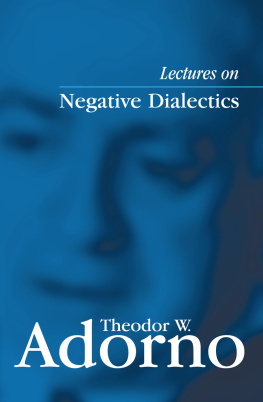Theodor W. Adorno - Aspects of the New Right-Wing Extremism
Here you can read online Theodor W. Adorno - Aspects of the New Right-Wing Extremism full text of the book (entire story) in english for free. Download pdf and epub, get meaning, cover and reviews about this ebook. year: 2020, publisher: Wiley, genre: Politics. Description of the work, (preface) as well as reviews are available. Best literature library LitArk.com created for fans of good reading and offers a wide selection of genres:
Romance novel
Science fiction
Adventure
Detective
Science
History
Home and family
Prose
Art
Politics
Computer
Non-fiction
Religion
Business
Children
Humor
Choose a favorite category and find really read worthwhile books. Enjoy immersion in the world of imagination, feel the emotions of the characters or learn something new for yourself, make an fascinating discovery.
- Book:Aspects of the New Right-Wing Extremism
- Author:
- Publisher:Wiley
- Genre:
- Year:2020
- Rating:3 / 5
- Favourites:Add to favourites
- Your mark:
- 60
- 1
- 2
- 3
- 4
- 5
Aspects of the New Right-Wing Extremism: summary, description and annotation
We offer to read an annotation, description, summary or preface (depends on what the author of the book "Aspects of the New Right-Wing Extremism" wrote himself). If you haven't found the necessary information about the book — write in the comments, we will try to find it.
Aspects of the New Right-Wing Extremism — read online for free the complete book (whole text) full work
Below is the text of the book, divided by pages. System saving the place of the last page read, allows you to conveniently read the book "Aspects of the New Right-Wing Extremism" online for free, without having to search again every time where you left off. Put a bookmark, and you can go to the page where you finished reading at any time.
Font size:
Interval:
Bookmark:
CONTENTS
Aspects of the New Right-Wing Extremism
Theodor W. Adorno
With an Afterword by Volker Weiss
Translated by Wieland Hoban
polity
Originally published in German as Aspekte des neuenRechtsradikalismus SuhrkampVerlag Berlin, 2019. All rights reserved by and controlled through SuhrkampVerlag Berlin.
This edition Polity Press, 2020
Polity Press
65 Bridge Street
Cambridge CB2 1UR, UK
Polity Press
101 Station Landing
Suite 300
Medford, MA 02155, USA
All rights reserved. Except for the quotation of short passages for the purpose of criticism and no part of this publication may be reproduced, stored in a retrieval system or transmitted, in any form or by any means, electronic, mechanical, photocopying, recording or otherwise, without the prior permission of the publisher.
ISBN-13: 978-1-5095-4146-1
A catalogue record for this book is available from the British Library.
The publisher has used its best endeavours to ensure that the URLs for external websites referred to in this book are correct and active at the time of going to press. However, the publisher has no responsibility for the websites and can make no guarantee that a site will remain live or that the content is or will remain appropriate.
Every effort has been made to trace all copyright holders, but if any have been overlooked the publisher will be pleased to include any necessary credits in any subsequent reprint or edition.
For further information on Polity, visit our website: politybooks.com
Aspects of the New Right-Wing Extremism
So, ladies and gentlemen,
I will not attempt to present a theory of right-wing extremism with any claim to comprehensiveness but, rather, I will highlight with some informal observations a few things of which you may not all be aware. It is thus not my intention to invalidate other theoretical interpretations, simply to add a little to what is generally thought and known about these matters.
In 1959 I gave a lecture entitled The Meaning of Working through the Past, in which I developed the thesis that the reason for right-wing extremism, or the potential for such a right-wing extremism, which was not yet truly visible at the time, is that the social conditions for fascism continue to exist. So I will work on the assumption, ladies and gentlemen, that, despite the collapse of fascism itself, the conditions for fascist movements are still socially, if not politically, present. Here I am thinking especially of the still prevailing tendency towards concentration of capital, which one can calculate away with all manner of statistical arts but which cannot seriously be doubted. At the same time, this tendency towards concentration still creates the possibility of constantly downgrading strata of society that were clearly bourgeois in terms of their subjective class consciousness and want to cling to, and possibly reinforce, their privileges and social status. These groups still tend towards a hatred of socialism, or what they call socialism; that is, they lay the blame for their own potential downgrading not on the apparatus that causes it, but on those who were critical towards the system in which they once had a status, at least in a traditional sense. Whether they are still critical and have the same practices today is another matter.
Now, the transition to socialism or, more modestly put, even just to socialist organizations has always been very difficult for these groups, and today, at least in Germany and naturally my experiences relate primarily to Germany it is even harder than it used to be. This is mostly because the SPD, the German social democratic party, is identified with a Keynesianism, a Keynesian liberalism that, on the one hand, deflects the potential for a change in social structures that was part of classical Marxian theory and, on the other hand, increases the threat of impoverishment, at least as a final consequence, for the social strata to which I referred. Let me remind you of the simple fact of the creeping, yet very noticeable inflation, which is a consequence precisely of Keynesian expansionism. Let me also recall a thesis that I developed in that study eight years ago, and which has meanwhile begun to gain relevance considerably, namely that, despite full employment and all such symptoms of prosperity, the spectre of technological unemployment continues to haunt society to such a degree that in the age of automation, which is less advanced in Central Europe but will undoubtedly catch up, even the people who stand within the production process already feel potentially superfluous I put this very starkly they really feel potentially unemployed. In addition there is the fear of the East, both because of the lower standard of living there and because of the lack of freedom, which is experienced in very direct and real terms by the people, the masses too, and also, at least until recently, the feeling of a foreign threat.
We must now remind ourselves of the remarkable situation that currently prevails with regard to the problem of nationalism in the age of the great power blocs. For, within these blocs, nationalism lives on as an organ of collective interest groups within the large-scale groups under discussion. It is beyond doubt that, in both socio-psychological and real terms, there is a very widespread fear of being absorbed by these blocs and, in the process, being severely impaired in ones material existence. Thus, when it comes to the potential of right-wing extremism in agriculture, there is no doubt an extremely great fear of the EEC and the consequences of the EEC for the agricultural market.
At the same time, however and this touches on the antagonistic character of the new nationalism, or right-wing extremism there is something fictitious about it if one looks at the grouping of the world of today into these few oversized blocs, where the individual nations and states really play only a secondary part. No one really believes in that any more. The individual nations freedom of movement is heavily restricted by its integration into the large power blocs. One should not, however, draw the primitive conclusion from this that, because it is now obsolete, nationalism no longer plays a significant role; on the contrary, it is very often the case that convictions and ideologies take on their demonic, their genuinely destructive character precisely when the objective situation has deprived them of substance. The witch trials, after all, took place not at the height of Thomism but during the Counter-Reformation, and something similar is probably the case with, if I may term it thus, the pathic nationalism of today. This aspect of selling something to people in which they themselves do not entirely believe was, incidentally, already evident in Hitlers day. And this fluctuation, this ambivalence between an overwrought nationalism and the doubt about it, which has to be covered up so that one can convince oneself and others, so to speak this could already be observed back then.
Now, let me draw a few initial conclusions from these rather basic theses. For I think that what I have told you that it is essentially about a fear of the consequences of overall social developments explains what has been observed everywhere by polling institutes and was also confirmed by our own work, namely that the adherents of old and new fascism can be found in all areas of todays society. I think the very widespread belief that all these movements are a specifically petty bourgeois phenomenon, as observed recently in French Poujadism, is accurate in terms of their social character, shall we say, but that this thesis is inaccurate when it comes to their distribution, even though certain petty bourgeois groups are undoubtedly susceptible, especially small merchants who are directly threatened by the concentration of the retail sector in department stores and similar institutions. Aside from them, another major group is the farmers, who are in a constant crisis, and I would think that, until the agricultural problem is solved in a radical way, one that is not artificial and based on subsidy and problematic in itself, until a sensible and rational collectivization of agriculture is achieved, this virulent breeding-ground will remain fertile.
Next pageFont size:
Interval:
Bookmark:
Similar books «Aspects of the New Right-Wing Extremism»
Look at similar books to Aspects of the New Right-Wing Extremism. We have selected literature similar in name and meaning in the hope of providing readers with more options to find new, interesting, not yet read works.
Discussion, reviews of the book Aspects of the New Right-Wing Extremism and just readers' own opinions. Leave your comments, write what you think about the work, its meaning or the main characters. Specify what exactly you liked and what you didn't like, and why you think so.

















